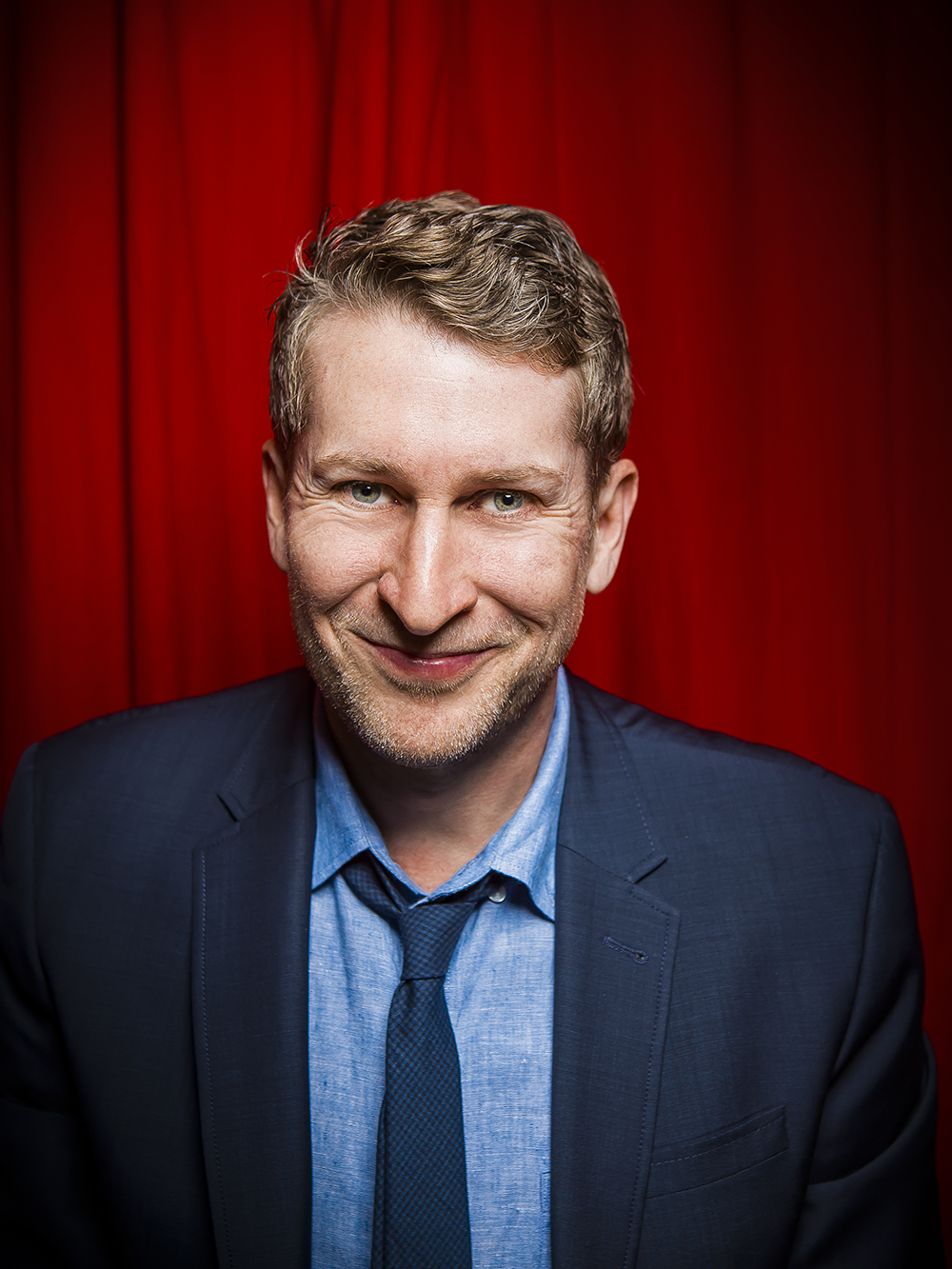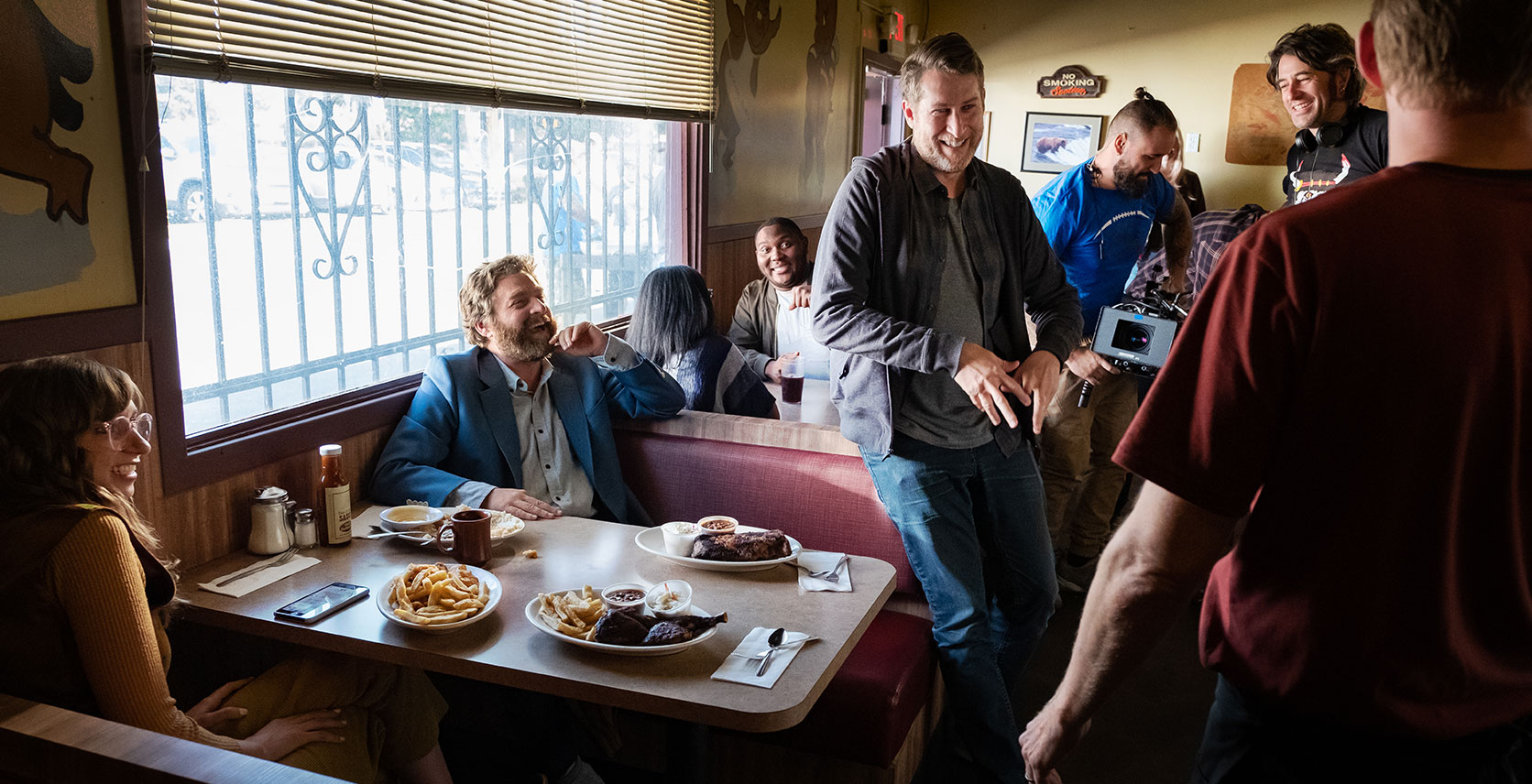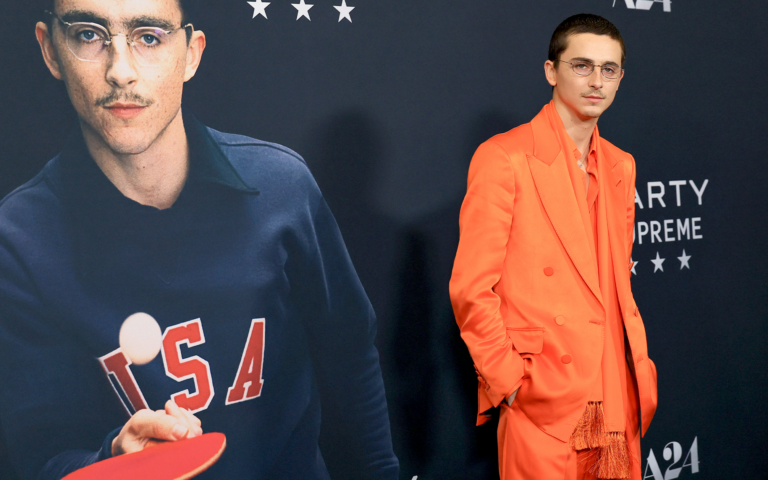If you are a fan of hilariously awkward interviews, as opposed to painfully awkward ones (sup Joaquin Phoenix?), then you’re in luck — Between Two Ferns, Zach Galifianakis’ cringe comedy web series, is back in the form of a Netflix film. It’s an 82-minute, gloriously uncomfortable romp, featuring a star-studded cast (from Matthew McConaughey to John Legend), passive-aggressive (and sometimes aggressive-aggressive) interviews, and some poorly-lit ferns. It also happens to be Scott Aukerman’s directorial debut.
Aukerman, to be sure, is a man of many trades — pretty much a septuple threat at this point — who has lead or at least taken part in a slew of successful comedic projects as an actor, writer, producer, and more. He’s the founder of the Earwolf Podcast Network, the host of the popular Comedy Bang! Bang! podcast (which just hit over 600 episodes!), and has been co-creating Between Two Ferns for the last decade. Now, two Emmys and an interview with a sitting president (Barack Obama, in 2014) later, he and Galifianakis’ parody talk show is ready for the big screen (or, more likely, your laptop screen). Aukerman’s quirky humour and creative mind made him the perfect person to helm this entirely improvised movie.
We caught up with Aukerman to chat about the experience of directing an unscripted film, his comedic roots, and what’s next for everyone’s favourite pair of flowerless plants.
Hey Scott! How are you doing? I know you’re here in town. Actually, how’s Toronto?
Toronto’s very cool. I thought that this was my second time here and I realized that I think I’ve been here three times. So that’s been exciting for me to add that math up. Other than that, pretty much just did a show and a screening and a bunch of press and then slept. But it’s a lovely city.
Yeah, well I’m sure you’ve been really busy lately with Between Two Ferns: The Movie.
Yeah, I’ve been healthily promoting it, which Zach and I both want to do because we’re really proud of it.
So what made you guys decide to turn it into a movie?
You know, we’ve always been very careful about not wanting to oversaturate the world with Between Two Ferns stuff. We were very careful about not putting out too many episodes and spacing them out. So I don’t think it’s something that we ever were thinking, you know — ‘let’s exploit this and let’s get this up on the big screen because it’s a good opportunity for us.’ It really was born out of us having so much fun doing them that we thought if we could take this kind of fun and improvisational spirit that we use when we make the actual episodes and make a movie out of this, unlike how most movies are made — which can be a very laborious process where people don’t get to improvise a lot because of how expensive everything is and how hurriedly you have to make it. But if we could just relax and have all of the characters improvise with each other, it could be just as fun as making the episodes. And that’s what we set out to do.
So what was it like working on an improvised movie? I know the whole idea of it was to relieve some of the stress — but does it also make things more stressful?
It was really fun to film and the cast had a ball. And every single day, the crew was just laughing. I mean everyone in the movie is just a brilliant genius improviser. The stress part of it gets to be, for me, more when in the post-production process, you put everything together in a string and you figure out that your first cut is over three hours long and just kind of figuring out how to whittle it down — what do people want from the movie and what are they laughing at the most? And then, how do you kind of take all of these random disparate improv scenes and put them in an order that not only makes sense but starts the characters in one place and ends them in another? That’s where the real challenge of doing this kind of thing lied.
“What I really wanted to do is add a sweet sensibility to it, which Zach innately has, just so it’s not a mean movie that’s contributing to a culture that can get very mean at times.”
For sure. So I know you’re the co-writer, the director, and the producer of the film, but how has it differed from working on the web series?
The web series is done in one room and it’s a very controlled environment. We don’t have a lot of people there. In the early days, we just set up the cameras; we didn’t even have camera operators. We don’t allow publicists in the room and it’s really just me and Zach and one or two other people. We used to film these in basements and the Natalie Portman one, we filmed in a gardening shed. You know, trying to up the scale of it a little bit while we tried to make it a very nimble and loose improv kind of filmmaking environment. Still, we’re doing things like having huge rain towers and filming out in the middle of the desert at three in the morning when it’s 30 degrees and being in mansions that suddenly we had to evacuate because of the fires in California — you know, like all of these things did make it a little harder to film, but that’s kind of the challenge when you’re trying to add a narrative around something that is just a silly little three minute video.
For sure. So, you mentioned the Natalie Portman interview, and you guys have had such amazing and well-known guests. Do you personally have a favourite guest that has been on the show? Is there someone who’s just been such an amazing sport?
Well, you know, as much as I love everyone who’s done it and what good sports they are, the most fun ones for me are when it’s a comedian or an actor that we know really well, like Paul Rudd, who may as well be a comedian. There’s just a level of comfort when it’s two comedians like Steve Carell or Will Ferrell or the people that we first started out with, like Michael Cera or Jon Hamm, where you know… or Brie Larson even, who was on my show Comedy Bang! Bang! She’s really funny and she gets it. It’s just kind of a different level of comfort when everyone is there playing and everyone is there to make sure that everything is a fun experience, as opposed to a stranger coming in and you don’t know how much they know about it. You don’t know how game they’re going to be. But that said, the people in the movie were all really supportive of the process. And I mentioned that we do it very small and contained and everyone was up for it, from Keanu Reeves to Benedict Cumberbatch to Awkwafina to David Letterman.
Has there ever been a guest who took the jokes way too personally? I know you prep them before they sit down for the interview. What exactly do you tell them? And even after you prep them, has there been someone that just got up and was like, “I can’t do this.”
No one has gotten up in the middle of anything. We will talk to people and say, “Hey, is there anything that we joked about that you don’t think you want out there in the public? Either it’s too personal…” That’s happened a few times and I don’t even really want to say what it is because they obviously don’t want people talking about it, which is why they didn’t want us to include it in the movie or videos. But occasionally the thing about the process is that they don’t know what we’re going to say and we don’t clear any question with them beforehand. So there have been times where I really wonder if people are genuinely upset while they’re filming it. Or even if they’re playing along and seeming like they’re having a good time, [I wonder] if they go home and say, “My feelings actually did get hurt by that.” It wouldn’t surprise me.
I’m a fan of yours and of Zach’s, and I just have to ask what it’s like working with Zach — is he as goofy and funny in real life as he is on camera?
Yeah. His commitment to comedy is very intense. You know, when people become movie stars they can start putting a lot of terms and conditions in about how much they’re going to film, what the conditions are going to be, their trailer size… Zach’s main priority is comedy and that’s where we really relate, he and I. We didn’t do this movie as a star trip or as a springboard to greater success. We really just wanted to make the funniest movie that we could. And the conditions that we made it in were very challenging. And Zach also took a chance on me, as someone who’s never directed a movie before. He could have easily said, “Hey, you’ve never done a movie before. I just can’t risk my career on this.” But he loved the idea. He loved everything that we talked about and just really supported me throughout it. I think if it was someone that I didn’t know personally, it would have been a very intimidating experience. And while it was an intimidating experience for me having never directed a film, he made it very easy and fun for me.
That’s nice! Did you always know that you wanted to end up in the comedy space?
I always loved the comedy space. I grew up loving SCTV and Monty Python and Saturday Night Live. I had an appreciation for it. And I think when I was young I was doing comedy-type things. I was very influenced by David Letterman and Pee-wee Herman. If I ever had a school project, I would kind of make fun of it and do a funny video for it or do a funny play or something. But I never really thought that I could do it professionally because it just seems like this unattainable goal. No one ever tells you how you become a comedian — it seems like everyone has done it out of luck. But honestly that’s how I fell into it, with luck. So once I did, I just sort of took a chance and did a show at the Comedy Store in 1995. It was something that I just fell deeply in love with and I think the second time I ever did comedy I just called myself a comedian after that and everyone just bought it.

Photo: Liezl Estipona
So you mentioned a couple of your inspirations in the comedy world, but did you have a mentor or role model working with you? Or you were just doing it on your own?
Definitely Bob Odenkirk took me under his wing and he’s the most supportive guy. Again, people in comedy tend to love comedy and love people that can make them laugh. So Bob Odenkirk was there the second time I ever performed and just really made sure that I felt like I was part of a community of people that I didn’t feel good enough to be a part of, or I didn’t feel skilled enough or that I’d been doing it long enough. But for instance, if we had a sketch show that we were doing, Bob would agree to be in it or he would go up and open for us or at the very least he would always come watch it and tell me what he thought of it. And that was very meaningful to me as a person. He’s one of the reasons I even got the guts to go up and do comedy, is because I saw him perform the week before and it clicked with me as something that I could do that was very similarly inclined. It just was very meaningful to me, up to the point of he appeared on my television show several times and he came to see an early cut of this movie and told me what he thought. And so he’s been one of the biggest supporters of not only me but other young comedians out there that I know of.
Right. So where did you get your taste for the type of humour that you like? Your humour is not the most conventional. Have you always liked this awkward, weird humour? What do you think liking that kind of thing says about someone?
When I was working on Mr. Show with Bob Odenkirk, they would call me the cross between Paul F. Tompkins and Brian Posehn. Which meant that I liked to write really smart stuff, but I also liked to write kind of like dirty, awkward, you know, more hardcore stuff as well, and if you cross that with loving things like “Weird Al” Yankovic and Pee-wee Herman, that’s sort of where my sensibilities lie. Between Two Ferns is all about, like, hardcore mean jokes in a way. But what I really wanted to do is add a kind of sweet sensibility to it, which Zach innately has, just so it’s not, you know, a mean movie that’s contributing to a culture that can get very mean at times. Really, my sensibility is, as much as I love jokes in something, when I see a movie or a TV show that just has jokes and abandons any kind of heart or feeling to it, I tend to get very frustrated. So that’s what we were setting out to do with this movie.
Do you think you’ll ever want to work on a sequel or it was a one-and-done type of thing?
I mean, I always wanted to direct a movie because, to me, growing up, that was the type of thing where I saw comedians — Monty Python and the Holy Grail, Spinal Tap, Airplane, The Naked Gun…the great comedies of my youth were all movies. So I really wanted to do something in that lineage or tradition. And as far as doing it again, you know, I have other types of movies I want to direct that are maybe not as improv-heavy, but I also would probably do another movie exactly like this one. If we were to do a sequel…I probably would. You know, it’s so much fun. Even though it’s such a huge amount of work and we’ve been working on it for two years, it also was so much fun that I probably would sign up.
You also founded the Earwolf Podcast Network before podcasting was even cool and now it’s like the coolest thing. Everyone does it…
I’m not quite sure that podcasts are cool yet. I still feel kind of an innate sense of shame anytime I tell someone who’s cool that I have a podcast and I see the look on their face.
To me, podcasts are so in — all of my favourite YouTubers or influencers, everyone has a podcast! I mean, I think it’s cool at least.
Thank you! [Laughs.]
Did you know that podcasts would become so big?
You know, I could tell. And we read a lot of literature about how podcasts would expand. I just knew I loved doing one and I knew it was such a great opportunity for comedians. It’s so hard when you’re a comedian because you know you’re funny and you know you can get up in front of a crowd and make people laugh in a live environment, but then you have to figure out how to transfer that to other mediums like film and television, that are so expensive that people just don’t want to take a chance on newcomers or a weird idea a lot of times. And so when podcasts came around and I started doing it and I started looking at the economics of it and saying, “Hey, these are relatively cheap to make and I can do anything and not only can I do anything in it, but people all around the world — suddenly there’s a delivery system for people to hear what I’m doing.” A light bulb went off in my head and I was like other comedians need to be doing this. I would have conversations with them saying, “Hey, you’re knocking yourself out every week or every month to do a show for a hundred people at the local comedy theatre, but you can have thousands of people listening to you if you just do a podcast.”
But again, you know, people thought they weren’t all that cool when they first started. And people would look at me like, “Yeah sure, who’s going to be listening to those? Like 10 nerds in a basement?” Now every comedian is mandated to have a podcast by law when they turn 18. They have to sign up for the draft and also start their podcast. I didn’t feel like I was doing it as a business opportunity more than I just saw an opportunity for comedy to get out there and for people to hear the types of comedians that I really loved.
For sure! I also want to congratulate you on the 10th anniversary of Comedy Bang! Bang!
Bless you, my child.
Did you ever think that it would grow this big and run for this long?
I did a live show at the Upright Citizens Brigade Theatre in Los Angeles. I did that for 10 years and at the end of the 10 years I was definitely ready to stop doing it. But when this rolled around to be 10 years, I kind of was like, Oh, I’d almost forgotten about it. I was like, 10 years. Oh, that’s actually a long time. That’s as long as I did the other thing and then I stopped doing it. But I really have no desire to stop at this point. I mean, like you say, podcasts are only getting more popular. [Laughs.] And so, I should be doing it when it’s at its peak instead of burning out early. But yeah, I mean, the thing about doing it is it’s just such a commitment; you have to put it out every week because people depend on your show. In my case, I come out on Mondays, so for their Monday happiness, you know. I read that the average number of episodes that podcasters do is six before they stop doing it, so it’s like if I’ve done 600, how many people are just doing one and saying like, “Uh forget it”?
Right! Wow! Do you have any big future plans that we should know about? Anything exciting coming up?
I have literally the opposite of big future plans. I started working on this movie in the summer of 2017 and have not stopped. And we shot for a really long time and edited for an even longer time and it just came out today and I still was editing last week — not the movie, but the Between Two Ferns episodes that we’re putting out in conjunction with the movie and so it just feels like a giant amount of my time has been taken up by it and I haven’t even been able to schedule anything else because it’s taken up so much of my time. So I’m honestly just going from all work, all the time to, come Wednesday, zero work and nothing lined up. Nothing could be more attractive to me at this point.
Yeah, I feel like you deserve that for sure.
[Laughs.] Thanks.



